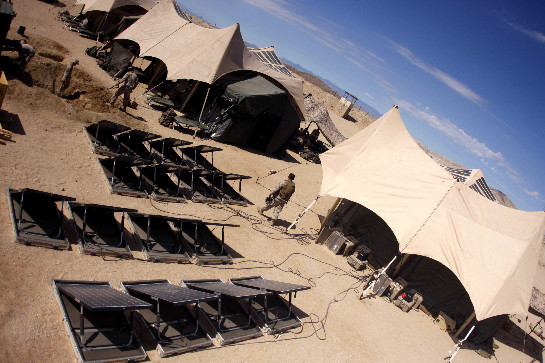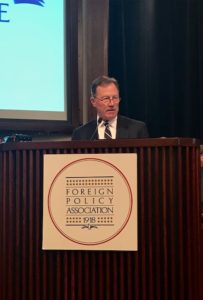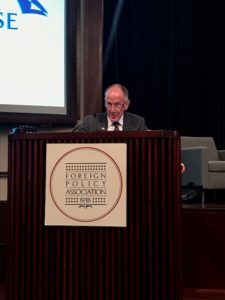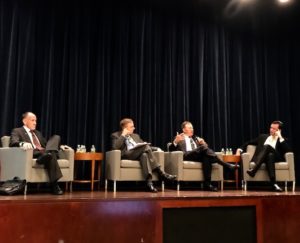
Event Recap: Clean Energy – Bolstering our National Security at Home and Abroad
The American Security Project held an event during the UN General Assembly in New York City on September 19th, 2017 on Clean Energy: Bolstering our National Security at Home and Abroad. The event began with opening remarks from three retired military leaders on why the military cares about clean energy, what it is already doing within the space and what it is planning for the future. The remarks were followed by a panel discussion and Q&A.
 Brigadier General Stephen Cheney USMC (Ret) and CEO of ASP opened the event by discussing the importance of energy to military operations. General Cheney began by defining “energy security” and making an important distinction between “energy security” and “energy independence.” He proposed that energy security should be defined not simply as the ability to have “uninterrupted access to energy resources at an affordable price” but rather that it is the “ability of a country to define its interests overseas independently from how it uses energy domestically.” Further, he pointed out that because of the globalized nature of our current energy markets, the concept of “energy independence” is neither attainable nor desirable. He closed by arguing that “we must see energy security as a long term process” and while the status is currently good, the outlook is still “hazy” and pursuing alternative, clean energy options is critical as we move into the future.
Brigadier General Stephen Cheney USMC (Ret) and CEO of ASP opened the event by discussing the importance of energy to military operations. General Cheney began by defining “energy security” and making an important distinction between “energy security” and “energy independence.” He proposed that energy security should be defined not simply as the ability to have “uninterrupted access to energy resources at an affordable price” but rather that it is the “ability of a country to define its interests overseas independently from how it uses energy domestically.” Further, he pointed out that because of the globalized nature of our current energy markets, the concept of “energy independence” is neither attainable nor desirable. He closed by arguing that “we must see energy security as a long term process” and while the status is currently good, the outlook is still “hazy” and pursuing alternative, clean energy options is critical as we move into the future.
Vice Admiral Lee Gunn USN (Ret) followed General Cheney by outlining why the military cares about the relationship between energy, climate change, and national security. Admiral Gunn noted that those leading the military, regardless of service, must think about long-term threats and plan to address them. Climate change is one of those threats. He broke down the threats of climate change to our national security into two categories, strategic and tactical. From the strategic perspective, climate change impacts national security by acting as a “threat multiplier” or “accelerant of instability.” As the climate warms, droughts and floods become more common, potentially leading to a collapse in local agriculture. In nations where agriculture is the primary form of employment, this can create instability as farmers are forced to their leave farms and communities see higher rates of unemployment and growing frustration and desperation. While climate change will never be the sole cause of conflict or instability, the impact of increasingly intense droughts, floods, and extreme weather will increase the likelihood of such situations arising.
Admiral Gunn continued by pointing out that militaries, both within the U.S. and abroad, are beginning to understand the threats of climate change. Admiral Gunn noted that the U.S. Quadrennial Defense Review and other military documents call for preparing for the risks of climate change. He also cited the findings from ASP’s Global Security Defense Index on Climate Change which found that over 70% of the world’s countries consider climate change a national security concern. The irony is that while the Department of Defense recognizes this threat, as the largest user of fossil fuels in the U.S., the DoD is significantly and negatively contributing to the problem. Therefore, not only is it important for the DoD to build energy security for the reasons General Cheney highlighted, but it is also important in order to combat the growing threats of climate change.
 Lieutenant General Norm Seip USAF (Ret) closed out the remarks by highlighting the current efforts to expand clean energy and efficiency within the military. He began by explaining how he witnessed the importance of fuel efficiency during his time in Afghanistan and Iraq where he saw the increasing number of men and women injured or killed protecting fuel convoys. If less fuel was required, those convoys would not have to be deployed as often, saving lives.
Lieutenant General Norm Seip USAF (Ret) closed out the remarks by highlighting the current efforts to expand clean energy and efficiency within the military. He began by explaining how he witnessed the importance of fuel efficiency during his time in Afghanistan and Iraq where he saw the increasing number of men and women injured or killed protecting fuel convoys. If less fuel was required, those convoys would not have to be deployed as often, saving lives.
General Seip gave a complete overview of how each of the services is already working to achieve this goal. He began with the Navy, highlighting the success of the Great Green Fleet. The Great Green Fleet was a year-long pilot program which was a “Department of the Navy initiative that demonstrates the sea service’s efforts to transform its energy use.” The program centered around the use of alternative fuels. For example, nuclear power was used for the John C. Stennis Strike Group (CSG) carrier and a blend of advanced biofuels for the CSG escort ships. The program proved that transitioning the military to cleaner fuel sources is possible. General Seip then discussed the Marines efforts to lower their energy usage to make their forces increasingly self-sufficient. He explained again how introducing portable solar panels and increasing energy efficiency to forward operating bases saves lives, as less fuel convoys aren’t required to travel to the front lines as often. Next, he explained the Army’s Net Zero program which focuses on making their bases and installations a net zero consumer of energy. The program is a “mission enabler,” making bases more resilient and effective. Finally, he discussed the Air Force’s Energy Flight Plan; a program designed to reduce energy intensity and expand the use of biofuels. He closed by pointing out that all of these programs contribute to energy security within the Department of Defense, making our military more ready, resilient and effective for the future.
The program closed with a lively Q&A session which is available in the recording. The recording will be available within the next week.
For more information on clean energy and the military, check out ASP’s just released Fact Sheet: Powering the Department of Defense.





